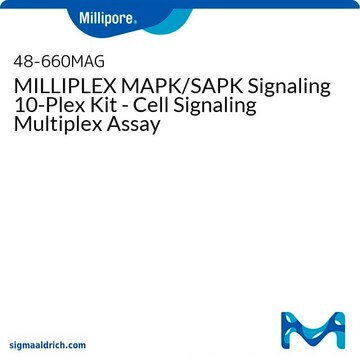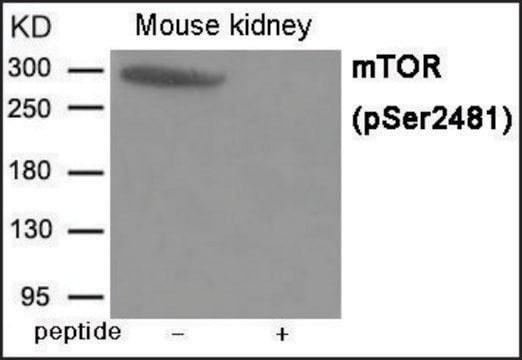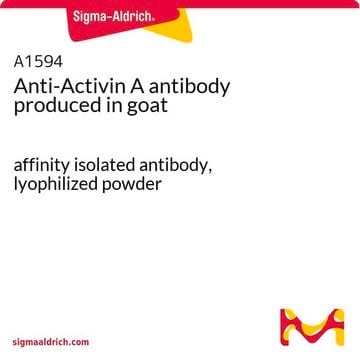17-191
MAP Kinase/Erk Assay Kit, non-radioactive
MAP Kinase/Erk Assay Kit is designed to measure the phosphotransferase activity of MAP (mitogen-activated protein) Kinase in immunoprecipitates & column fractions.
Sign Into View Organizational & Contract Pricing
All Photos(1)
About This Item
UNSPSC Code:
12161503
eCl@ss:
32161000
NACRES:
NA.84
Recommended Products
Quality Level
manufacturer/tradename
Upstate®
technique(s)
activity assay: suitable (kinase)
NCBI accession no.
UniProt accession no.
shipped in
wet ice
Application
MAP Kinase/Erk Assay Kit is designed to measure the phosphotransferase activity of MAP (mitogen-activated protein) Kinase in immunoprecipitates & column fractions.
Used to detect/quantify: MAP Kinase/Erk
Components
Assay Dilution Buffer I (ADBI) (Cat.# 20-108)
MAP Kinase/Erk Substrate Cocktail II (Cat.# 20-166)
Inhibitor Cocktail (Cat.# 20-116)
Magnesium/ATP Cocktail (Cat.# 20-113)
Anti-phospho-MBP, clone P12 (Cat.# 05-429)
MAP Kinase/Erk Substrate Cocktail II (Cat.# 20-166)
Inhibitor Cocktail (Cat.# 20-116)
Magnesium/ATP Cocktail (Cat.# 20-113)
Anti-phospho-MBP, clone P12 (Cat.# 05-429)
Quality
The assay kit is designed to measure the phosphotransferase activity of MAP (mitogen-activated protein) Kinase in immunoprecipitates and column fractions. The assay kit is based on phosphorylation of a specific substrate (myelin basic protein, MBP). The phosphorylated substrate is then analyzed by immunoblot analysis, probing with a monoclonal Phospho-specific MBP antibody.
Other Notes
This product is derived from bovine source. Export of this product to certain countries may be restricted. Please contact Customer Service or your local distributor to inquire about product availability and export options.
Legal Information
UPSTATE is a registered trademark of Merck KGaA, Darmstadt, Germany
Disclaimer
Unless otherwise stated in our catalog or other company documentation accompanying the product(s), our products are intended for research use only and are not to be used for any other purpose, which includes but is not limited to, unauthorized commercial uses, in vitro diagnostic uses, ex vivo or in vivo therapeutic uses or any type of consumption or application to humans or animals.
Storage Class Code
12 - Non Combustible Liquids
Flash Point(F)
Not applicable
Flash Point(C)
Not applicable
Certificates of Analysis (COA)
Search for Certificates of Analysis (COA) by entering the products Lot/Batch Number. Lot and Batch Numbers can be found on a product’s label following the words ‘Lot’ or ‘Batch’.
Already Own This Product?
Find documentation for the products that you have recently purchased in the Document Library.
M Zanetti et al.
The Journal of biological chemistry, 269(11), 7855-7858 (1994-03-18)
A group of myeloid precursors of defense peptides has recently been shown to have highly homologous N-terminal regions. Using a strategy based on this homology, a novel cDNA was cloned from pig bone marrow RNA and found to encode a
Madhukar Varshney et al.
Analytical chemistry, 80(6), 2141-2148 (2008-02-15)
Nanomechanical resonators have shown potential application for mass sensing and have been used to detect a variety of biomolecules. In this study, a dynamic resonance-based technique was used to detect prion proteins (PrP), which in conformationally altered forms are known
Matilde Marchi et al.
PloS one, 3(12), e3873-e3873 (2008-12-05)
The Extracellular Regulated Kinase 1 and 2 transduce a variety of extracellular stimuli regulating processes as diverse as proliferation, differentiation and synaptic plasticity. Once activated in the cytoplasm, ERK1 and ERK2 translocate into the nucleus and interact with nuclear substrates
D Carré-Eusèbe et al.
The Biochemical journal, 277 ( Pt 1), 39-45 (1991-07-01)
Protamine P2, the major basic chromosomal protein of mouse spermatozoa, is synthesized as a precursor almost twice as long as the mature protein, its extra length arising from an N-terminal extension of 44 amino acid residues. This precursor is integrated
Ignazia Tusa et al.
Stem cell reports, 11(4), 929-943 (2018-09-25)
Tyrosine kinase inhibitors (TKi) are effective against chronic myeloid leukemia (CML), but their inefficacy on leukemia stem cells (LSCs) may lead to relapse. To identify new druggable targets alternative to BCR/ABL, we investigated the role of the MEK5/ERK5 pathway in
Our team of scientists has experience in all areas of research including Life Science, Material Science, Chemical Synthesis, Chromatography, Analytical and many others.
Contact Technical Service







